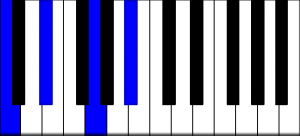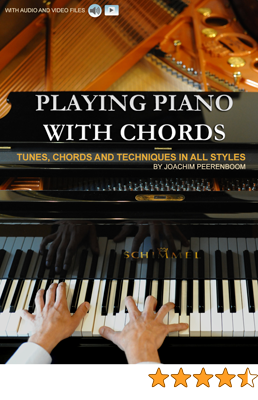More than most other musical styles, funk is based on a very tight and accurate rhythm. While rock, pop, blues, or jazz are strongly defined by melodies and harmony, funk is all about groove. So, how does this translate into piano playing?
A few basic concepts to create funk grooves on the piano
A very simple rhythm involves playing on the counts 1, 2, 3, and 4. In this example, you’ll be playing C minor seventh chords in the right hand and the root C in the left hand.
Example 1


C minor 7
This eight-note grid can be counted as 1 and, 2 and, 3 and, 4 and. In the next example, play the right-hand chords on the offbeats, or the ‘ands’, alternating between the left and right hands.
Example 2

The eight notes in both examples can also be replaced by sixteenth notes, which are half as long. Here is how that sounds:
Example 3

Example 4

Playing funk piano chords in a sixteenth-note grid
So far, everything has been played in an eighth-note grid. To make it sound funkier, let’s use a sixteenth-note grid. Here you count:
1 e and a, 2 e and a, 3 e and a, 4 e and a
This gives you four possible times to play a note in each bar. In the next exercise, all right-hand chords are played on the ‘e’ after the full beats, i.e. 1 e, 2 e, 3 e, and 4 e.
Example 5

In the last example, the right-hand chords are played on the e-and-a of each beat, i.e., 1-e-and-a, 2-e-and-a, and so on.
Example 6

If you practice these different ways to place the right-hand funk chord within the sixteenth-note grid, you can start creating funky rhythms by arranging the chords in various patterns across the grid.
If you’re just starting with funk piano, take it slow and focus on building a solid foundation. Begin with simple exercises like playing steady quarter-note or eighth-note grooves to get comfortable with the rhythm. Don’t be discouraged by mistakes; they’re a natural part of the learning process. Embrace them as opportunities to improve and keep practicing regularly to build confidence and skill.
Check out the next piano blog post for more funk piano chords and rhythms!


